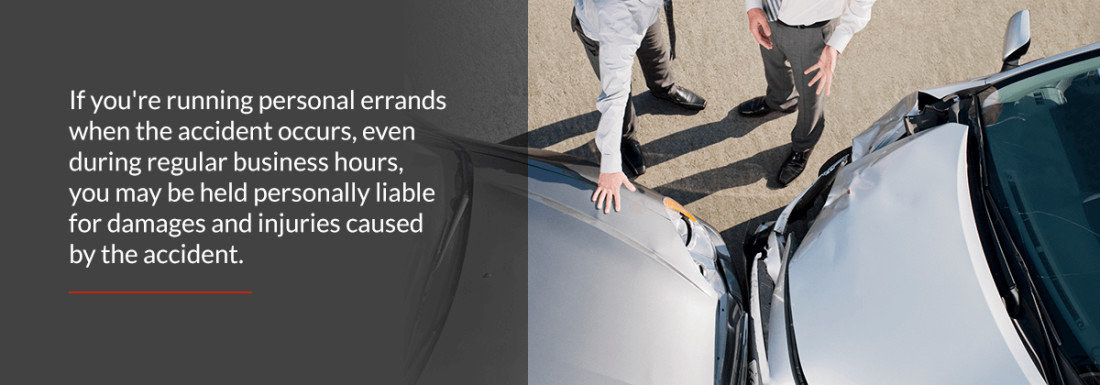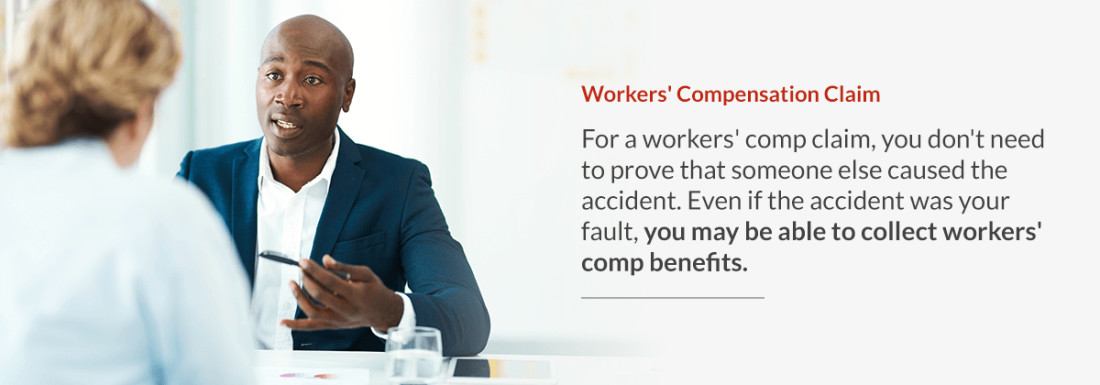Have you been injured in a work vehicle? What rights do you have as an injured employee, and what compensation are you entitled to? The boundaries between work and personal life are becoming increasingly blurrier, so it's essential to understand your rights if you're injured in a work car accident.
In this guide, we'll discuss what to do if you're injured in a work vehicle, how to determine who is responsible and what the difference is between workers' comp and a personal injury lawsuit.
When the Company Is Responsible and When the Employee Is Responsible
Who pays for the damages if you've been in an accident while in a work vehicle? Who is responsible for an accident at work — you or your employer? In the US, about three million people are injured in car accidents every year, and these accidents are just as likely to happen in a work vehicle as they are in a personal vehicle.
While you may expect that you'll be covered by your employer's insurance provider if you cause an accident while driving a company vehicle, you may actually be personally responsible for damages or injuries caused by the accident.
When the Employer Is Responsible
Employers are responsible for their employees' actions while they are working — this means they are responsible for paying for property damages and injuries that the employee causes while driving a work vehicle. In most work vehicle accidents, the employer's insurance provider protects employees from needing to pay for damages.
When the Employee Is Responsible

In some situations, the employer's insurance company won't cover employees who cause accidents with company vehicles. The following are examples of situations in which you won't be covered by your employer's insurance company if you cause an accident while driving a work vehicle:
- You're an independent contractor: If you're using your personal vehicle on behalf of your employer, you may be personally liable for a car accident while working. For example, if you use your personal car for pizza deliveries, you may be liable for an accident.
- You use the vehicle for personal reasons: If you're running personal errands when the accident occurs, even during regular business hours, you may be held personally liable for damages and injuries caused by the accident. If you were engaging in horseplay, you may also not be able to file a successful claim.
- You engage in criminal activity: If you commit a crime while you're driving a work vehicle and the accident you're in involves criminal activity, you may be responsible for the accident. This includes if you drive your work vehicle under the influence of alcohol or drugs.
Whether you or your employer is determined to be responsible may affect your workers' comp or personal injury case.
Workers' Comp vs. Personal Injury Lawsuit
Both workers' comp and personal injury lawsuits can apply when you're injured at work. A workers' comp claim should be filed immediately after the accident, while a personal injury claim can be filed if you were hit and injured by another driver.
There are differences in the type of compensation that can be claimed through workers' comp and a personal injury claim:
- Benefits for a personal injury claim: For a personal injury claim against another driver, you'll receive compensation for medical bills and other losses resulting from the car accident.
- Benefits for a workers' comp claim: For a workers' comp claim, you can receive payments for quantifiable losses and costs, like lost wages and medical bills.
While you won't receive compensation for pain and suffering via workers' comp, you may be able to receive this compensation through a personal injury claim.
Workers' Compensation Claim

For a workers' comp claim, you don't need to prove that someone else caused the accident. Even if the accident was your fault, you may be able to collect workers' comp benefits.
Filed When Work-Related
The accident must be work-related to file a workers' comp claim and receive benefits successfully. But, when is driving considered part of the job? You may be able to receive workers' comp benefits in the following situations:
- You're making a delivery.
- You have no fixed office and you're traveling for work.
- You're transporting other employees somewhere.
- You're driving a work vehicle to run an errand for your employer or supervisor.
- Your company pays you for your travel time when you're driving to or from home.
When is driving considered off-the-job and unable to be filed as a workers' comp claim? Typically, you won't be able to receive workers' comp benefits for an accident while you're commuting to and from work. Though there are exceptions, such as if you stop on the way to purchase supplies for your office.
Workers' Compensation Claim Process
For a workers' compensation claim, you'll file your claim by following the procedures outlined by your state laws. You or your employer may file the paperwork with the state workers' compensation agency. Usually, you must report a work-related injury to your employer immediately or within a short period, which varies by state. For example, in Delaware, you have 90 days to notify your employer.
Personal Injury Lawsuit
If you were injured in a car accident at work or while working caused by another driver, you might be able to file a personal injury claim against the other driver.
Filed When Injured by Another Driver
When would it be appropriate to file a personal injury lawsuit? If another driver caused the crash, you might be able to file a personal injury claim. To successfully file a personal injury claim, you must prove the other driver was responsible for the accident.
Personal Injury Lawsuit Process
Unlike a workers' compensation claim, a personal injury claim is filed at your state's local branch of the civil court system. You may file a personal injury lawsuit or claim directly with the other driver's insurance provider. With a personal injury lawsuit, you have a larger timeframe within which you can file a claim than you have with a workers' comp claim.
Can I File a Workers' Compensation Claim and a Personal Injury Lawsuit?
In most cases, you can file workers' compensation and personal injury claims. Even after accepting workers' comp benefits, you can still seek damages from the other driver responsible for the accident.
However, if you do receive workers' comp benefits, your employer's insurance provider may be entitled to some of the compensation you receive from a third party.
Maximize Your Claim Value by Hiring an Attorney
Have you been in a car accident while working in Delaware? Our lawyers are ready to assist you with your case. We strive to help our clients receive fair and total compensation.
Do you need assistance with your personal injury claim? Contact us today for a free consultation.






